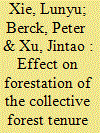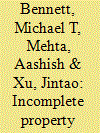| Srl | Item |
| 1 |
ID:
147429


|
|
|
|
|
| Summary/Abstract |
The Chinese government has allowed collective village forest land to pass into individualized ownership. The purpose was to alleviate rural poverty and stimulate investment in forests. Using data collected from 288 villages, in eight provinces, over three years, this paper measures the effect of the individualization on one aspect of forest investment, forestation. Because villages voted on the reform, we identify the causal effect of the reform by an instrumental variable estimator based on the countywide decision to offer the reform package. We find an increase in forestation of 7.68% of forest land in the year of the reform.
|
|
|
|
|
|
|
|
|
|
|
|
|
|
|
|
| 2 |
ID:
110497


|
|
|
|
|
| Publication |
2011.
|
| Summary/Abstract |
This paper uses data from a 2003 rural survey to examine the determinants of household provision of environmental services under China's Sloping Land Conversion Program (SLCP), the largest payments for environmental services program in the developing world. The paper examines the determinants of plot-level survival rates of program-planted trees and grasses. It finds that household rights over retired land as well as autonomy in program decision-making (which we argue on the basis of supportive evidence are plausibly exogenous to post-retirement outcomes) have important and potentially countervailing impacts on the provision of environmental services targeted by the program. Households permitted to select what to plant obtain better program outcomes, but do not make the choices that the government would like them to, while those permitted to decide what land to retire perform worse. The analysis also finds that households more vested and experienced in agriculture and with less exposure to off-farm labor markets fare better in managing their planted trees. Significant learning-by-doing effects are also evident, suggesting that greater technical support to farmers could improve outcomes and lower program costs.
|
|
|
|
|
|
|
|
|
|
|
|
|
|
|
|
| 3 |
ID:
177093


|
|
|
|
|
| Summary/Abstract |
Developing the abundant shale gas in China is a potential means to address the country’s challenges in air pollution and carbon emissions. The purpose of this paper is to evaluate the production potential of the most promising shale gas play—the Wufeng-Longmaxi Formation (WL) in China. We use a Difference-Index analogy method and well-level U.S. shale gas drilling data to estimate the production potential and use a scenario simulation method to propose optimal drilling plans. The results show that the Wufeng-Longmaxi Formation has the potential to produce 70 billion cubic meters of natural gas per year (Bcm/yr), which is 60% of the gas imported into China in 2018. With technology improvement and drilling of more wells, the target of 80–100 Bcm/yr set by the government can be achieved solely by extraction from WL. We find that shale gas drilling is profitable with a well-head price of 1.5 Chinese Yuan per cubic meter. The study indicates that a shale gas boom in China is possible, depending on a more competitive market both upstream and downstream. The successful development of shale gas will change the country’s energy mix to become cleaner and lower-carbon.
|
|
|
|
|
|
|
|
|
|
|
|
|
|
|
|